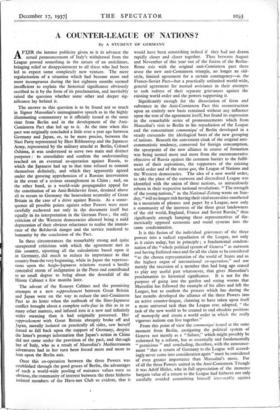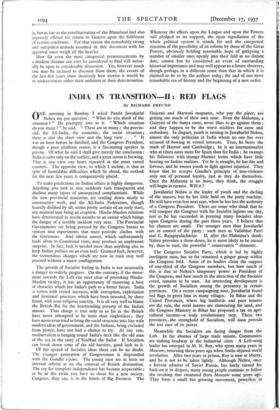A COUNTER-LEAGUE OF NATIONS ?
By A STUDENT OF GERMANY
AFTER the intense publicity given to it in advance the actual pronouncement of Italy's withdrawal from the League proved something in the nature of an anticlimax, bringing relief or disappointment to all those who had been led to expect some completely new venture. The mere regularisation of a situation which had become more and more incongruous during the last eighteen months seemed insufficient to explain the historical significance obviously ascribed to it by the form of its proclamation, and inevitably raised the question whether some other and deeper sig- nificance lay behind it.
The answer to this question is to be found not so much in Signor Mussolini's -unimaginative speech as in the highly illuminating commentary to it officially issued at the same time from Berlin and in the development of the Anti- Comintern Pact that led up to it. At the time when this pact was originally concluded a little over a year ago between Germany and Japan, or, to be more precise, between the Nazi Party represented by Herr Ribbentrop and the Japanese Army, represented by the military attache at Berlin, Colonel Oshima, it was understood to serve two main and distinct purposes : to consolidate and confirm the understanding reached on an eventual co-operation against Russia, to which the Japanese had up to that time refused to commit themselves definitely, and which they apparently agreed under the growing apprehension of a Russian intervention in the event of a serious entanglement in China ; and, on the other hand, as a world-wide propagandist appeal for the constitution of an Anti-Bolshevist front, destined above all to secure to Germany the benevolent neutrality of Great Britain in the case of a drive against Russia. As a conse- quence all possible points against other Powers were most carefully eschewed not only in the document itself but equally in its interpretation in the German Press ; the only criticism of the Western democracies allowed being a mild deprecation of their obvious reluctance to realise the immin- ence of the Bolshevik danger and the service rendered to humanity by the conclusion of the Pact.
In these circumstances the remarkably strong and quite unexpected criticisms with which the agreement met in this country, upsetting all the calculations based upon it in Germany, did much to reduce its importance to that country from the very beginning, while in Japan the repercus- sion& upon the Anglo-Japanese relations roused a hardly concealed storm of indignation in the Press and contributed to no small degree to bring about the downfall of the Hirota Cabinet a few months later.
The advent of the Konoye Cabinet and the promising attempts at a new rapprochement between Great Britain and Japan were on the way to reduce the anti-Comintern Pact to its letter when the outbreak of the Sino-Japanese conflict brought about a complete volte-face in this as in so many other matters, and infused into it a new and infinitely wider meaning than it had originally possessed. Her rapprochement with Great Britain abruptly broke off and Japan, morally isolated on practically all sides, saw herself forced to fall back upon the support of Germany, despite the latter's prompt information that Japan's action in China did not come under the provision of the pact, and through her of Italy, who as a result of Mussolini's Mediterranean adventures had in her turn been forced more and more to lean upon the Berlin axis.
Once this co-operation between the three Powers was established through the good graces of Berlin, the advantages of such a world-wide pooling of nuisance values were so obvious, the community of interest between the three hitherto isolated members of the Have-not Club so evident, that it would have been astonishing indeed if they had not drawn rapidly closer and closer together. Thus between August and November of this year out of the fusion of the Berlin- Rome axis with the original anti-Comintern pact there arose the new anti-Comintern triangle, no longer an old- style, limited agreement for a certain contingency—as the Franco-Soviet Pact—but a practically unlimited world-wide, general agreement for mutual assistance in their attempts to seek redress of their separate grievances against the existing world order and the powers supporting it.
Significantly enough for the dissociation of form and substance in the Anti-Comintern Pact this reconstruction upon an entirely new basis remained without any influence upon the text of the agreement itself, but found its expression in the remarkable series of pronouncements which from Mussolini's visit to Berlin to his repudiation of the League and the concomitant communique of Berlin developed in a steady crescendo the ideological basis of the new grouping of nations. Beneath the convenient cloak of the original anti- communistic tendency, conserved for foreign consumption, the spearpoint of the new alliance in course of formation was being turned more and more from the unremunerative objective of Russia against the common barrier to the fulfil- ment of their aspirations, the supporters of the existing world order and of the status quo, the League of Nations and the Western democracies. The idea of a new world order, to take the place of the outworn and discredited League was identified with the union of three nations, so miraculously reborn in their respective national revolutions. "The strength of the young nations," as the National-Zeitung wrote on Sun- day, "will no longer risk having their vital necessities smothered in a mountain of phrases and paper by a League, now only a community of the interests of the three great landowners of the old world, England, France and Soviet Russia," thus significantly enough lumping these representatives of dia- metrically opposed economic and social systems into the same condemnation.
It is this fusion of the individual grievances of the three powers into a radical repudiation of the League, not only as it exists today, but in principle ; a fundamental condem- nation of the "whole political system of Geneva" as outworn and having forfeited once and for all the claim to be considered "as the chosen representation of the world of States and as the highest organ of international co-operation," and not merely the secession of a member that had long ago ceased to play any useful part whatsoever, that gives Mussolini's proclamation its historical significance. It is not for the purpose of going into the garden and eating worms that Mussolini has followed the example of his allies and left the League, but to confirm the process which has during the last months developed the alliance of the three Powers into an active counter-league, claiming to have taken upon itself a more universal task than the League ever adopted, " the task of the new world to be created to end obsolete positions of monopoly and create a world order in which the really vigorous nations can live together."
From this point of view the communiqué issued at the same moment from Berlin, castigating the political system of Geneva not merely as a "failure," which might possibly be redeemed by a reform, but as essentially and fundamentally " pernicious " and concluding, therefore, with the announce- ment " that a return of Germany to the League will accord- ingly never come into consideration again " must be considered of even greater importance than Mussolini's move. For of all the three Powers united in the Anti-Comintern Triangle it was Adolf Hitler, who in full appreciation of the immense bargain value of a return to the League had hitherto not only carefully avoided committing himself irrevocably against it, but as late as the remilitarisation of the Rhineland had also expressly offered his return to Geneva upon the fulfilment of certain conditions. For that reason the remarkably strong and outspoken attitude assumed in this document with his approval must weigh all the heavier.
How far even the most categorical pronouncements by a modern dictator can ever be considered as final will natur- ally be open to considerable discussion. Yet, however much one may be inclined to discount from them, the events of the last few years show decisively how unwise it would be to underestimate either their ambition or their determination. Whatever the effects upon the League and upon the Powers still pledged to its support, the open repudiation of the whole political system it stands for and the categorical rejection of the possibility of its reform by three of the Great Powers, obviously holding reasonable hope of gathFring • a number, of smaller ones openly into their fold at no distant date, cannot but be considered an event of outstanding historical importance and may well appear to a future observer, though perhaps in a different sense than that in which it is claimed to be so by the authors today, the end of one most remarkable era of history and the beginning of a new order.















































 Previous page
Previous page